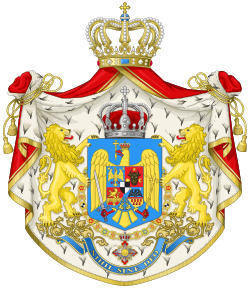 Top: Flag of the Kingdom of Romania Bottom: The coat of arms of the Kingdom of Romania | |
| Regions with significant populations | |
| Wallachia (Muntenia and Oltenia) and Western Moldavia | |
| Languages | |
| German, Romanian | |
| Religion | |
| Roman Catholicism and Lutheranism | |
| Related ethnic groups | |
| Germans and Austrians | |
Lived in Wallachia and Moldavia between the late 19th century and mid 20th century (and, in very smaller numbers, to the present day as well) |
Regat Germans or Old Kingdom Germans (German : Regatsdeutsche or Altreichsdeutsche/Altreich-Deutsche) are an ethnic German group of the eastern and southern parts of Romania. The Regat is a Romanian-language term ascribed for the initial territorial extent of the Kingdom of Romania before World War I, roughly the regions of the current state of Romania to the south and east of Transylvania.
Contents
Consequently, this territory includes Western Moldavia, Northern Dobruja, Muntenia, Oltenia, and the Hertsa region (now in Chernivtsi Oblast, southwestern Ukraine). Most of the Regat German population was re-settled in the mid 20th century during World War II through the Heim ins Reich national socialist population transfer policy. Nowadays, the remaining Regat Germans, as all other German groups in Romania, are represented in local and central politics by the Democratic Forum of Germans in Romania (FDGR/DFDR). The Regat Germans are part of the Romanian Germans. [ citation needed ]

